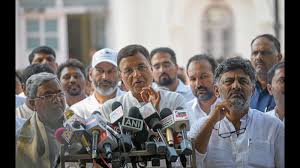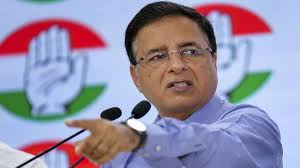Randeep Singh Surjewala: Standing Firm Against Misinformation Amidst Political Controversy ( रणदीप सिंह सुरजेवाला: गलत सूचना के खिलाफ मजबूती से खड़े राजनीतिक विवाद के बीच )

In the tumultuous landscape of Indian politics, every statement and action can trigger a flurry of reactions and controversies. Such is the case with senior Congress leader Randeep Singh Surjewala, who finds himself under fire from the Bharatiya Janata Party (BJP) for his remarks regarding actor-politician Hema Malini. Amidst the storm of criticism, Surjewala has stood his ground, accusing the BJP’s IT cell of distorting facts and spreading lies.
In the heat of political discourse, it’s not uncommon for statements to be twisted and misrepresented for strategic advantage. Randeep Singh Surjewala’s recent comments on Hema Malini’s political role sparked a fierce backlash from the BJP. However, rather than succumbing to pressure, Surjewala chose to confront the issue head-on, highlighting the pervasive issue of misinformation perpetuated by the BJP’s IT cell.
Surjewala’s assertion about the BJP’s IT cell habitually distorting facts and spreading lies underscores a broader concern about the role of technology in shaping public opinion. In an era dominated by social media and digital communication, the dissemination of accurate information has become increasingly challenging. Political parties, including the BJP, have leveraged digital platforms to propagate their narratives, often at the expense of truth and integrity.
The controversy surrounding Surjewala’s remarks serves as a poignant reminder of the importance of discerning truth from falsehood in the realm of politics. As citizens, we are bombarded with a barrage of information from various sources, making it imperative to exercise critical thinking and scrutiny. Surjewala’s refusal to back down in the face of BJP’s criticism exemplifies a commitment to truth and q discourse.
Moreover, Surjewala’s stance sheds light on the broader issue of accountability in political communication. Accusations of misinformation and propaganda are not unique to one party but have become endemic across the political spectrum. By calling out the BJP’s IT cell, Surjewala holds them to a higher standard of transparency and ethical conduct, setting a precedent for responsible communication in politics.
In the age of digital misinformation, combating falsehoods requires a multifaceted approach that encompasses both technological solutions and individual responsibility. Surjewala’s bold stance against the BJP’s IT cell serves as a rallying cry for greater vigilance and accountability in online discourse. As consumers of information, we must exercise caution and diligence in verifying the authenticity of news and statements circulated online.
Furthermore, Surjewala’s critique of the BJP’s IT cell reflects a broader concern about the erosion of trust in institutions and political discourse. When partisan agendas take precedence over truth and integrity, the very fabric of democracy is jeopardized. Surjewala’s unwavering commitment to truth-telling represents a beacon of hope in an environment plagued by falsehoods and misinformation.
Ultimately, the controversy surrounding Randeep Singh Surjewala’s remarks on Hema Malini underscores the urgent need for ethical communication practices in politics. In the face of relentless attacks from the BJP, Surjewala remains steadfast in his conviction that truth must prevail over propaganda. By exposing the BJP’s IT cell’s tactics of distorting facts and spreading lies, Surjewala challenges us to demand greater accountability and transparency from our political leaders and institutions.
Moreover, Surjewala’s unwavering stance serves as a reminder of the power of individuals to challenge and resist the manipulation of information by those in positions of authority. In a democracy, the free flow of accurate information is essential for informed decision-making and holding leaders accountable. By speaking out against the BJP’s IT cell, Surjewala demonstrates a commitment to upholding the principles of transparency and honesty in public discourse.
The controversy surrounding Surjewala’s remarks also highlights the growing influence of digital media in shaping public opinion and political narratives. Social media platforms have become battlegrounds where political parties vie for control over the dissemination of information. However, this digital landscape is fraught with challenges, including the proliferation of fake news and the weaponization of information for political gain.
Surjewala’s accusations against the BJP’s IT cell underscore the need for robust mechanisms to combat misinformation and ensure the integrity of online discourse. Efforts to fact-check and debunk false claims are crucial in safeguarding the public sphere from manipulation and deception. Surjewala’s outspoken criticism serves as a call to action for tech companies, civil society, and policymakers to collaborate in addressing the scourge of digital misinformation.
Furthermore, Surjewala’s refusal to be intimidated by the BJP’s attacks exemplifies the resilience required to uphold democratic values in the face of adversity. In a political climate rife with polarization and division, it is easy for dissenting voices to be silenced or marginalized. However, Surjewala’s steadfastness serves as an inspiration for others to speak truth to power and resist efforts to suppress dissenting viewpoints.
At its core, the controversy surrounding Surjewala’s remarks is not just about political rivalry but about the fundamental principles that underpin democracy. In a democracy, citizens have the right to access accurate information and make informed decisions based on facts. When political parties resort to misinformation and distortion, they undermine the very foundations of democracy and erode public trust in the institutions that govern them.
In conclusion, Randeep Singh Surjewala’s confrontation with the BJP over his remarks on Hema Malini epitomizes the broader struggle for truth and integrity in political communication. His refusal to back down in the face of criticism demonstrates a commitment to upholding democratic values and holding those in power accountable. As citizens, we must remain vigilant against attempts to manipulate information and distort reality for political gain. Surjewala’s courage serves as a reminder that the battle for truth is ongoing and requires the collective effort of all those who cherish democracy and freedom of expression.
